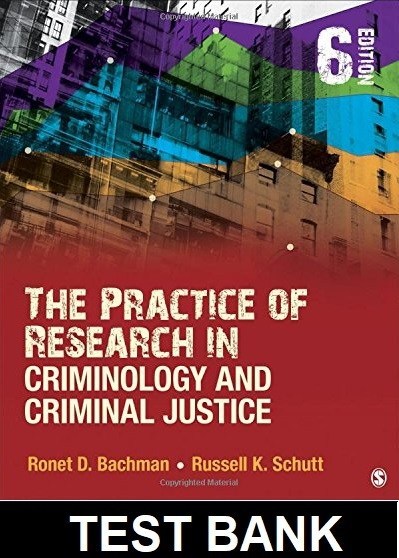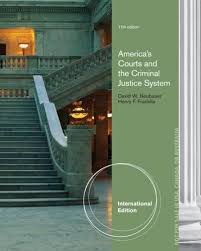Description
Test Bank For Practice of Research In Criminology And Criminal Justice 6th Edition By Bachman
Bachman, The Practice of Research in Criminology and Criminal Justice 6th Edition
Chapter 3: Doing Research Ethically
Test Bank
1. Which of the following is not one of the ethical elements established in the “Belmont Report”?
a. Beneficence
b. Justice
*c. Compensation
d. Respect
Section: Historical Background
Bloom’s Taxonomy: Knowledge
2. Which of the following was not an issue with the Tuskegee Syphilis Study:
a. Proper medical treatment was withheld from some subjects.
b. Informed consent was not obtained from subjects.
c. Some subjects were not told that they had syphilis.
*d. The subjects were given substantial amounts of money to participate that it affected their voluntary participation.
Section: Historical Background
Bloom’s Taxonomy: Knowledge
3. Researchers must set aside all personal biases and prejudices if research is to be approached:
*a. Objectively
b. Qualitatively
c. Quantitatively
d. Subjectively
Section: Ethical Principles
Bloom’s Taxonomy: Knowledge
4. In order to ensure openness and honesty in research, all of the following should be, if not published, at least open to public scrutiny except:
a. Data
b. Data collection methods
c. Research procedures
*d. Subjects’ names
Section: Ethical Principles
Bloom’s Taxonomy: Knowledge
5. One year after completion of Milgram’s obedience study, interviews with the subjects found that:
*a. The majority reported that they were pleased with their participation in the study
b. The majority reported that they were displeased with their participation in the study.
c. Older subjects, but not younger subjects, reported that they were pleased with their participation in the study
d. Almost all reported traumatic reactions as a result of participation in the experiment.
Section: Ethicial Principles
Bloom’s Taxonomy: Knowledge
6. All of the following are requirements when obtaining informed consent except:
a. Subjects must be informed of their roles in the research study.
*b. Subjects can never be deceived.
c. Subjects must consent voluntarily.
d. Subjects must comprehend what they are told.
Section: Ethical Principles
Bloom’s Taxonomy: Knowledge
7. Institutional review boards regulate:
a. All experiments involving humans, animals, plants, or robotics.
b. Experiments involving animals only.
*c. Experiments involving human subjects.
d. Experiments in which subjects are at great risk of physical harm.
Section: Historical Background
Bloom’s Taxonomy: Knowledge
8. Which of the following groups is not considered to be a vulnerable population, subject to special protection?
*a. The elderly
b. Pregnant women
c. Prisoners
d. Educationally disadvantaged persons
Section: Ethical Principles
Bloom’s Taxonomy: Knowledge
9. Which of the following groups can give only assent, but not informed consent, to participate in a study?
a. University students
*b. Children
c. Economically disadvantaged persons
d. Prisoners
Section: Ethical Principles
Bloom’s Taxonomy: Knowledge
10. If only some research subjects—not all—were given compensation for participation in a study, this would be a violation of:
a. Informed consent
b. Beneficence
*c. Justice
d. Respect for persons
Section: Historical Background
Bloom’s Taxonomy: Application
11. The domestic violence study conducted in 1984 by Sherman and Berk had an ethical concern in that:
a. They financially profited from the research.
b. They did not adhere to special protections for vulnerable populations.
*c. They potentially withheld a beneficial treatment.
d. They deceived their subjects.
Section: Ethical Principles
Bloom’s Taxonomy: Knowledge
12. Of the following violations to general ethical rules, which is the most common and most acceptable if properly addressed?
*a. Deceiving subjects
b. Mentally torturing subjects
c. Publishing the names and addresses of respondents
d. Physically harming the subjects
Section: Ethical Principles
Bloom’s Taxonomy: Knowledge
13. Bergen and her colleagues’ research on pedophilia in chatrooms involved issues related to:
a. Informed consent and voluntariness
b. Deception and debriefing
c. Debriefing and deception
*d. Informed consent and deception
Section: Ethical Principles
Bloom’s Taxonomy: Knowledge
14. Which of the following is an accurate statement about the long-term effects of participation in Zimbardo’s prison study?
a. Some of the guards experienced long-term adverse effects.
*b. None of the participants experienced long-term adverse effects.
c. Some of the prisoners experienced long-term adverse effects
d. Guards and prisoners experienced long-term adverse effects.
Section: Ethical Principles
Bloom’s Taxonomy: Knowledge
15. Which of the following is not a current ethical standard?
a. Research should avoid harm to subjects.
b. Anonymity or confidentiality should be maintained.
c. Researchers should fully disclose their identity when possible.
*d. Subjects should be financially compensated for their time and effort.
Section: Ethical Principles
Bloom’s Taxonomy: Knowledge
16. The ethics of Zimbardo’s prison study have been debated because researchers:
a. Informed consent was not obtained.
b. Subjects were deceived.
c. Participation was not voluntary.
*d. Some subjects were harmed as they experienced adverse psychological reactions.
Section: Ethical Principles
Bloom’s Taxonomy: Knowledge
17. Which of the following is not an aspect of the requirement that subjects give informed consent to participate in research?
a. Subjects must be competent to consent.
*b. Subjects must be fully debriefed immediately after the study.
c. Subjects must consent voluntarily.
d. Subjects must fully understand what they are consenting to.
Section: Ethical Principles
Bloom’s Taxonomy: Knowledge
18. Which of the following is an accurate summary regarding voluntary participation?
*a. Voluntary participation is required for all subjects.
b. Subjects can be forced into participating based on the discretion of the researcher.
c. Only specially protected groups cannot be coerced into participating.
d. Subjects can be forced into participating if it is believed that the findings of the experiment have great social importance.
Section: Ethical Principles
Bloom’s Taxonomy: Comprehension
19. Which of the following is an accurate statement about Milgram’s and Zimbardo’s opinions about their experiments?
a. Zimbardo maintained that his experiment was ethical, but Milgram did not.
*b. Milgram maintained that his experiment was ethical, but Zimbardo did not.
c. Both Zimbardo and Milgram maintained that their experiments were ethical.
d. Both Zimbardo and Milgram believed that their experiments were unethical.
Section: Ethical Principles
Bloom’s Taxonomy: Knowledge





Be the first to review “Test Bank For Practice of Research In Criminology And Criminal Justice 6th Edition By Bachman”